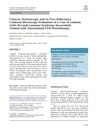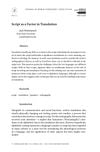October 2021 in “Operative techniques in otolaryngology--head and neck surgery” The document concludes that various surgical techniques and postoperative care are used to protect eye health, improve vision, and restore facial balance in people with facial paralysis.
 28 citations,
September 2015 in “Wiener Klinische Wochenschrift”
28 citations,
September 2015 in “Wiener Klinische Wochenschrift” New skin substitutes for treating severe burns and chronic wounds are being developed, but a permanent solution for deep wounds is not yet available commercially.
 15 citations,
January 2014 in “Anais Brasileiros de Dermatologia”
15 citations,
January 2014 in “Anais Brasileiros de Dermatologia” Lupus treatment requires a combination of drugs and therapies, with research needed for new options.
 1 citations,
February 2004
1 citations,
February 2004 Skin diseases are common and can significantly affect people's lives; better outcome measures and ethical clinical trials are needed to improve dermatology care.
 December 2019 in “Mehmet Akif Ersoy Üniversitesi Sağlık Bilimleri Enstitüsü dergisi”
December 2019 in “Mehmet Akif Ersoy Üniversitesi Sağlık Bilimleri Enstitüsü dergisi” One cat with low thyroid hormone had growth issues, and another with high thyroid hormone had skin problems; both got better with treatment.
 57 citations,
August 1998 in “The journal of small animal practice/Journal of small animal practice”
57 citations,
August 1998 in “The journal of small animal practice/Journal of small animal practice” Malassezia-associated dermatitis can cause itching in cats with feline paraneoplastic alopecia.
 19 citations,
October 2011 in “Clinics in Dermatology”
19 citations,
October 2011 in “Clinics in Dermatology” New chemotherapy drugs cause skin side effects, but treatments like minocycline and tetracycline can help reduce them.
 3 citations,
September 2014 in “Journal of obstetrics and gynaecology Canada”
3 citations,
September 2014 in “Journal of obstetrics and gynaecology Canada” Menopause often leads to lower sexual desire and discomfort during sex, but treatment should be personalized and only if it bothers the woman.
 September 2021 in “International journal of Ayurveda and pharma research”
September 2021 in “International journal of Ayurveda and pharma research” Ayurvedic treatment improved hypothyroidism in a 30-year-old man.
 April 2015 in “Cambridge University Press eBooks”
April 2015 in “Cambridge University Press eBooks” Many women experience sexual dysfunction, but few seek help, and better treatment and medical training are needed.
 June 1996 in “Irish Journal of Medical Science (1971 -)”
June 1996 in “Irish Journal of Medical Science (1971 -)” The document summarizes medical findings on topics like heart rhythm treatment, sleep apnea therapy, and various health conditions and treatments.
 January 1978 in “Clin-Alert”
January 1978 in “Clin-Alert” A document listed serious side effects from various drugs, including deaths and diseases, emphasizing the importance of being aware of drug side effects.
 1057 citations,
November 2011 in “Annals of Biomedical Engineering”
1057 citations,
November 2011 in “Annals of Biomedical Engineering” Low-level Laser Therapy may help reduce inflammation, pain, and aid healing, but more research is needed to confirm its effectiveness and establish standard treatment guidelines.
 62 citations,
October 2017 in “JAMA facial plastic surgery”
62 citations,
October 2017 in “JAMA facial plastic surgery” Condensed nanofat with fat grafts effectively improves atrophic facial scars.
 40 citations,
January 2009 in “Skin Pharmacology and Physiology”
40 citations,
January 2009 in “Skin Pharmacology and Physiology” Fetal cells could improve skin repair with minimal scarring and are a potential ready-to-use solution for tissue engineering.
 34 citations,
June 2010 in “Archives of Disease in Childhood”
34 citations,
June 2010 in “Archives of Disease in Childhood” Menstrual disorders are common in adolescents and can be influenced by weight, activity, and health issues, requiring careful evaluation and more research for effective treatment.
 11 citations,
January 1991 in “Urology”
11 citations,
January 1991 in “Urology” New hormonal treatments for enlarged prostate show promise for safer, effective non-surgical options.
 6 citations,
September 2005 in “Expert Opinion on Pharmacotherapy”
6 citations,
September 2005 in “Expert Opinion on Pharmacotherapy” Androgen therapy can help with symptoms like low libido in women, but more research is needed to understand its long-term safety and effects on health.
 5 citations,
November 2007 in “British journal of nursing”
5 citations,
November 2007 in “British journal of nursing” Nurses should treat emollients as medications, understanding their use and effects for treating skin conditions.
 2 citations,
June 2020 in “Dermatology and therapy”
2 citations,
June 2020 in “Dermatology and therapy” Narrowband-UVB phototherapy successfully treated a rare case of Graham Little-Piccardi-Lassueur syndrome.
 1 citations,
January 2016 in “Journal of world literature”
1 citations,
January 2016 in “Journal of world literature” The conclusion is that the type of writing system used can significantly affect the translation of a text.
 1 citations,
July 1973 in “British Journal of Dermatology”
1 citations,
July 1973 in “British Journal of Dermatology” The document concludes that secondary syphilis cases are increasing and often misdiagnosed, pityriasis rubra pilaris can be distinguished from psoriasis by skin cell features, and different skin layers produce specific components during skin repair.
 March 2024 in “International Research Journal Of Modernization In Engineering Technology And Science”
March 2024 in “International Research Journal Of Modernization In Engineering Technology And Science” Certain plants like Aloe vera and Neem are effective and safe for treating various skin conditions.
 238 citations,
July 2003 in “British Journal of Plastic Surgery”
238 citations,
July 2003 in “British Journal of Plastic Surgery” Hidradenitis suppurativa, a chronic skin disease, can be managed with antibiotics, lifestyle changes, and in severe cases, surgery. Early diagnosis and careful planning are key, and laser treatment can be an efficient solution for mild to severe cases.
 202 citations,
June 2005 in “Aaps Pharmscitech”
202 citations,
June 2005 in “Aaps Pharmscitech” Lecithin organogels could be good for applying drugs to the skin because they are stable, safe, and can improve drug absorption.
 191 citations,
February 2002 in “Archives of Dermatology”
191 citations,
February 2002 in “Archives of Dermatology” Some herbal therapies may help with skin conditions, but more research is needed to confirm their safety and effectiveness.
 177 citations,
July 2004 in “The Journal of Sexual Medicine”
177 citations,
July 2004 in “The Journal of Sexual Medicine” Experts recommend thorough medical, sexual, and psychosocial assessments for women's sexual dysfunctions, and suggest individualized treatment plans with regular check-ups. They also mention potential use of estrogen and androgen therapy, but with caution due to safety concerns.
 170 citations,
September 2019 in “Evidence-based Complementary and Alternative Medicine”
170 citations,
September 2019 in “Evidence-based Complementary and Alternative Medicine” Some medicinal plants can help heal wounds and may lead to new treatments.
 144 citations,
September 2006 in “Clinics in Dermatology”
144 citations,
September 2006 in “Clinics in Dermatology” Lupus affects the body and skin, causing joint pain and skin issues that can be treated with steroids and antimalarial drugs.
 86 citations,
July 1993 in “Drugs”
86 citations,
July 1993 in “Drugs” Finasteride treats enlarged prostate, shrinks it, improves urination, but may cause sexual dysfunction and isn't for women or children.




























